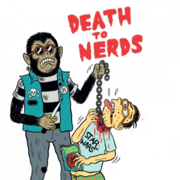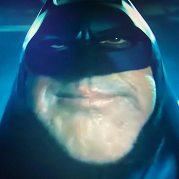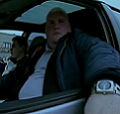|
It's too self aware of its need for the plot devices to not "matter" in the traditional movie-viewing sense. Poor implementation.
|
|
|
|

|
| # ? May 7, 2024 10:19 |
|
I don't agree with that at all.
|
|
|
|
The only ambiguous thing I thought was sort of a misstep was not explaining how the door was opened. I know the point was that it didn't matter, but in that instance I thought it did matter and it felt a bit cheap that the whole scenario was left to the viewer to decipher. That said, I understand why they did it like that and I don't think it detracted from the movie too much. I was happy with the ending.
|
|
|
|
veni veni veni posted:The only ambiguous thing I thought was sort of a misstep was not explaining how the door was opened. I know the point was that it didn't matter, but in that instance I thought it did matter and it felt a bit cheap that the whole scenario was left to the viewer to decipher. That said, I understand why they did it like that and I don't think it detracted from the movie too much. My guess is that it didn't matter because in a sense it was inevitable. The door is paranoia, doubt, however you'd describe it. It finds a way in (opens) no matter what you do. Also it makes the entire rest of the film that much more murky and vague, so you are just left watching a tragedy unfold with no clear good/bad guys (or characters 100% free of culpability).
|
|
|
|
Yeah for sure. I see what they we're going for, it's just frustrating for the viewer I think. I haven't decided whether or not I think the film is better or worse for it.
|
|
|
|
Anonymous Robot posted:I'd argue that the film is in large part a metaphor for nativism/immigration panic/anxieties regarding the death of the nation-state, and Paul, as the authoritarian patriarchal strong-man who ends up murdering several in an attempt to dominate their bodies, is certainly the villain. This is an interesting reading, but I don't necessarily believe that I agree with it. Paul kills 3 men over the course of the movie - Sarah's father after becoming sick, and the two men who attack him in the truck. While Bud isn't in the movie for long, I don't see him coded as an outsider. I don't recall the exact specifics of Paul's conversation with Will over a drink - but even if he admitted to killing the other family members who lived in the home, that also seems like it wouldn't push the idea of "immigration panic". Paul's killing of the two attackers seems like it is based on fear and blind rage, which could certainly apply, but it doesn't give the impression that he wanted to "dominate their bodies" - they attacked him, and he reacted with survivalism over humanity. Will rightly pointed out that the attackers could have had information, and it was my impression that Paul likely agreed with him after the adrenaline rush was over. With that said, I think there might be something to your reading as it relates to Sarah, who seemingly simply "goes along" with things the entire movie. She momentarily disagrees with Paul asking for Travis to help him with burying and burning Bud, but otherwise has no qualms with Paul's actions, even up to the point where she kills Will at Paul's request. Again, even if we attribute this kill to Paul, it is based on survivalism, and not a need to dominate over Will. Overall, the ambiguity of the film means that I don't particularly take issue with calling Paul the villain, I just don't know if your reasoning really sells me on it. Nevertheless, I'd be interested in hearing more regarding your take on it. JoeRules fucked around with this message at 00:11 on Jun 23, 2017 |
|
|
|
GonSmithe posted:Nah that's not true at all. I mean yeah a lot of bad movies have bad endings, but there are plenty of movies that end and people think they are bad because "nothing happened."
|
|
|
|
Yeah I wouldn't say that's a bad comparison.
|
|
|
|
Yeah that's a fair comparison in terms of overall mood.
|
|
|
|
FWIW I thought The VVItch was good but I loving hated the very end. For that reason alone I thought this was miles better (I thought the way this one ended was great).
|
|
|
|
JoeRules posted:This is an interesting reading, but I don't necessarily believe that I agree with it. Paul kills 3 men over the course of the movie - Sarah's father after becoming sick, and the two men who attack him in the truck. While Bud isn't in the movie for long, I don't see him coded as an outsider. I don't recall the exact specifics of Paul's conversation with Will over a drink - but even if he admitted to killing the other family members who lived in the home, that also seems like it wouldn't push the idea of "immigration panic". Paul's killing of the two attackers seems like it is based on fear and blind rage, which could certainly apply, but it doesn't give the impression that he wanted to "dominate their bodies" - they attacked him, and he reacted with survivalism over humanity. Will rightly pointed out that the attackers could have had information, and it was my impression that Paul likely agreed with him after the adrenaline rush was over. The attackers are certainly a credible threat and the response to them is not unjustified. That's how the film poses its argument for the existence of the nation state; there are "bad guys" out there and we need a strong, militant stance to keep us from being victimized by them. And you're on the money about Sarah- the power dynamics between Paul and Sarah and Stanley have a characterization that moves on a gradient between being patronizing (if, at times, correct) and being held captive. One must note the racial makeup of the family, in reading this relationship. But of course, this reading is most direct when it comes to the relationship between Paul and Will. Will is latinx, describes himself as a migrant laborer (in a sense,) and isn't permitted to join the household until he demonstrates that he can bring new value to it. When I mention "dominating their bodies" in relation to the notion of immigration panic and citizenship, I'm not referring to the pathogen imagery or the compulsion to euthanize the sick (though that does build this theme in other ways,) but rather to the climax of the film, and in particular Paul's peculiar motivation and behavior. Now, there's a certain sense to wanting to keep Will from leaving with half of their goods. Maybe that's survival instinct. But it's important to recognize that that dimension of the conflict is already resolved by the time Will is murdered. After being held at gunpoint, Will agrees to leave without anything. Paul has no reason to keep him from leaving; given that he believes Will's family is sick, that would really be ideal for him. But by this point, he's acting on this subconscious domineering instinct, a compulsion to control people's movement, to confine and contain. It's an emotional appeal towards maintaining the status quo, it's entirely tangential to any of the problems actually facing the characters, and because they cannot see beyond it, all of them will die.
|
|
|
|
veni veni veni posted:Yeah I wouldn't say that's a bad comparison. NCFOM has one of the greatest endings of all time, this is definitely not that. But the abruptness inspires the same howling rejection.
|
|
|
|
yeah, I really really like NCFOM's ending but... I feel like I've made my thoughts on this one fairly clear  I dunno, maybe I'll be kinder to it on a rewatch; I can't say marketing colored my expectations, since I knew almost nothing going in except that it had Joel Edgerton, was maybe post-apocalyptic, and kinda seemed like a horror movie maybe.
|
|
|
|
I'm sure the marketing helped it sell a lot of tickets it wouldn't have otherwise sold, but it felt pretty dishonest and probably left a lot of people angry leaving the theater.
|
|
|
|
Call me hard-hearted but I don't understand why they don't kill people the minute they get sick. As far as we see there's no hope of getting better, the sickness is agonizing, and they're highly contagious. Also if my time playing Pandemic taught me anything, it's that a disease that kills its hosts too quickly has a hard time spreading. It looks like society's pretty thinned out and everyone lives far away from other people. You clearly can't travel once the disease is in full swing, which takes about a day from infection. So how are people covering enough ground in their one post-infection/pre-incapacitation day to infect other people? I know, I know, "that's not the point," but if you're going to minimalist yourself out of putting any actual content in your movie my mind's going to find a way to occupy itself. I thought this had great visuals - rare to find a fresh take on shooting spooky trees - and heartwrenching acting, but that ending made the audience in my screening laugh and I walked away feeling like the whole thing was pretty hollow. https://www.youtube.com/watch?v=7rwUdL9qXjk
|
|
|
|
Anonymous Robot posted:The attackers are certainly a credible threat and the response to them is not unjustified. That's how the film poses its argument for the existence of the nation state; there are "bad guys" out there and we need a strong, militant stance to keep us from being victimized by them. And you're on the money about Sarah- the power dynamics between Paul and Sarah and Stanley have a characterization that moves on a gradient between being patronizing (if, at times, correct) and being held captive. One must note the racial makeup of the family, in reading this relationship. drat. I'm still not entirely sold on your reading, but the climax was so intense that I honestly can't argue against it, simply because recalling all the details is very hard. Thank you for expanding on your reading nonetheless.
|
|
|
|
Tiny Brontosaurus posted:Call me hard-hearted but I don't understand why they don't kill people the minute they get sick. As far as we see there's no hope of getting better, the sickness is agonizing, and they're highly contagious. Also if my time playing Pandemic taught me anything, it's that a disease that kills its hosts too quickly has a hard time spreading. It looks like society's pretty thinned out and everyone lives far away from other people. You clearly can't travel once the disease is in full swing, which takes about a day from infection. So how are people covering enough ground in their one post-infection/pre-incapacitation day to infect other people? I'm of the opinion that the grandfather got Travis sick and the incubation period wherein they are contagious is far longer than they think it is. I finally saw this last night, my girlfriend and I loved it and talked about it until well after getting home. Had a lot of similar opinions and reactions as seen in this thread (especially in the crowd-you could tell some were enthralled while others were loudly sucking their teeth at the screen when the credits rolled) One theory I hadn't seen in here that we talked about a while is did Will actually know the people waiting in ambush right outside their camp and change his mind on who to back, since Paul was clearly winning in the surprise attack? I think Will (1) really did only care about saving his family, and (2) may have been working with a crew that they traded with. He seemed used to that idea. Will panicked when Paul killed the guy he'd been beating on ("NO!!") because he knew him and felt guilt, then quickly turned out a white lie (which he's good at) that they could've asked him for info about whether he's part of a bigger crew (admission of knowledge?) Will demonstrated he wasn't willing to kill, or hesitated to, multiple times. when Paul found him he could have easily dropped him with that shotgun. Will also wasn't willing to kill the man he was beating on that surprised them, I think he hoped that all of them could forgive and work together just as Paul had forgiven him, he's working with what he can in a split second moment. Donovan Trip fucked around with this message at 14:29 on Jul 23, 2017 |
|
|
|
Sorry for the thread necromancy, but the DVD cover for this, holy poo poo. There is some marketing group somewhere that is dead set on making the popcorn crowd really angry.
|
|
|
|
I'm definitely in the camp that believes that Grandpa had already infected everyone by the time the film starts. The slower incubation time before signs show could be explained many ways; it seems like Paul doesn't really know anything at all about what's going on except in a vague sense, he's a History teacher not a Science teacher. I think there might be legs to theory that the disease is spread by fear and paranoia rather than blood/air/germs, as well. The titular "It" that "Comes at Night" is fear, after all. And as a wise man once said, "Fear is the mind-killer."
|
|
|
|
veni veni veni posted:Sorry for the thread necromancy, but the DVD cover for this, holy poo poo. I saw this in Target and nearly busted out laughing.
|
|
|
|
This was a boring movie with too many things unexplained. The Road did a better job showing some bleak post-apocalyptic world.
|
|
|
|

|
| # ? May 7, 2024 10:19 |
|
Tenzarin posted:This was a boring movie with too many things unexplained. The Road did a better job showing some bleak post-apocalyptic world. I felt like every single thing that was left unexplained was best left that way. It's not a perfect movie as in flawless, but it perfectly says what it set out to say and not a word more. veni veni veni posted:Sorry for the thread necromancy, but the DVD cover for this, holy poo poo. that is fuckin' hilarious and i hope a lot of survivalist gun nuts at walmart buy it
|
|
|












